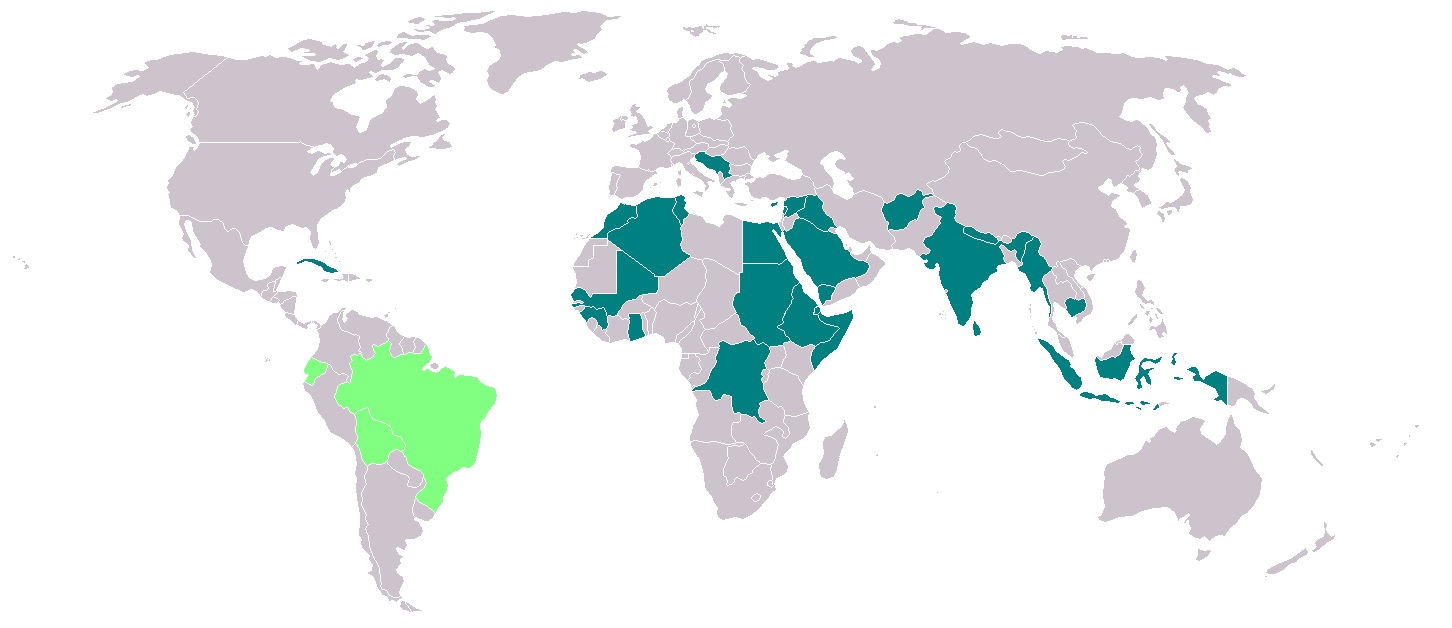
Map of the participants of the first Summit of the Non-Aligned Movement (1961).
“Guinea, Burkina [Faso], and Mali want to launch an unofficial organization of non-aligned African countries and unite to be stronger in the face of sub-regional bodies.”
The Foreign Affairs Ministers of Burkina Faso, Guinea, and Mali—West African countries all led by military heads of state that claimed power outside of elections[i]—recently convened in early February. The meeting ultimately concluded with them all seeking to fully rejoin the Economic Community of West African States (ECOWAS), which has placed various sanctions on each of the countries over the past two years.[ii] According to the accompanying excerpted article from the francophone West African news site Le Journal de L’Afrique, the meeting is being read locally as an attempt to circumvent future sanctions by creating alternative forms of sub-regional unity. As the author of the article articulates, the countries “want to launch an unofficial organization of non-aligned African countries and unite to be stronger in the face of sub-regional bodies.” Of note, Mali and Burkina Faso are the two West African countries most closely tied to Russia, whose Foreign Minister, Sergei Lavrov, visited Mali days before the meeting. A reversion to “non-aligned” rhetoric of African international relations suggests that as competition between the United States, China, and especially Russia, deepens on the continent, West Africans increasingly view such jockeying through the lens of a new Cold War, and thus seek to maintain policy autonomy. This appears to be true in this case, even though two of the three countries—Mali and Burkina Faso—are known Russian allies. While Guinea’s inclusion in the trifecta may be read, as it is by the accompanying article’s author, as “an encounter between marginalized countries,” meaning those sanctioned because of military takeovers,it can equally be read as a meeting of West African states in the Russian orbit. While Guinea clearly falls into the first category, it is not often discussed as part of the second., Guinea looks to be high on the list of which African states Russia might next target for allyship.
Source:
Frédéric Ange Touré, “Pour le Mali, le Burkina Faso et la Guinée, l’union pourra-t-elle faire la force? (For Mail, Burkina Faso, and Guinea, can unity be strength?),” Le Journal de L’Afrique (pan-African news aggregator), 9 February 2023. https://lejournaldelafrique.com/pour-le-mali-le-burkina-faso-et-la-guinee-lunion-pourra-t-elle-faire-la-force/
While the Ministers of Foreign Affairs of the various African countries are used to meeting, often under the aegis of sub-regional organizations or the African Union, the meeting between the heads of diplomacy from Burkina Faso, Mali, and Guinea looks like an encounter between marginalized countries.
These three countries have in common to have suffered coups in recent years. But also for having tried to stand up to ECOWAS and other organizations that threatened them with sanctions – which were most of the time applied. Finally, from Bamako to Ouagadougou, via Conakry, the Russian temptation has succeeded partnerships with France.
Under the aegis of the Burkinabè government, the three foreign ministers, Abdoulaye Diop, Morissanda Kouyaté and Olivia Rouamba, wanted to meet to discuss the future of their countries. A meeting which, coincidence or not of the calendar, took place barely two days after the visit of the Russian Minister of Foreign Affairs, Sergei Lavrov, to Mali. The latter, among other things, promised his aid “to the Sahelo-Saharan region and even to the countries bordering the Gulf of Guinea.”Morissanda Kouyaté, before any joint declaration, sold the wick as to the message that would be sent. “Together, we are going to make a statement to regional organizations, so that we can hear even more audibly the claims and requests of our peoples through our governments and our leaders”. In other words, Guinea, Burkina and Mali want to launch an unofficial organization of non-aligned African countries and unite to be stronger in the face of sub-regional bodies.
Notes:
[i] Mali experienced overthrows of the government in August 2020 and May 2021, Guinea in September 2021, and Burkina Faso in January 2022.
[ii] For more on ECOWAS’ sanctions against these countries, see: “ECOWAS lifts Mali sanctions, agrees on Burkina transition,” AfricaNews, 4 July 2022. https://www.africanews.com/2022/07/04/ecowas-lifts-mali-sanctions-agrees-on-burkina-transition//
Image Information:
Image: Map of the participants of the first Summit of the Non-Aligned Movement (1961)
Source: https://commons.wikimedia.org/wiki/File:1st_Summit_of_the_Non-Aligned_Movement.jpg
Attribution: Creative CommonsAttribution-Share Alike 4.0 International
